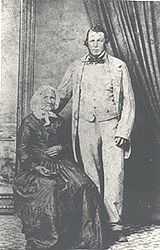Maria Ann Smith

Maria Ann "Granny" Smith (1799–1870) was a British-Australian orchardist responsible for the cultivation of the Granny Smith apple.
Early life
Maria Ann Sherwood was born in 1799 in Peamarsh in the English county of Sussex, and was baptized on 5 January 1800 in the Peamarsh church of St Peter and St Paul. She was the daughter of John Sherwood, a farm labourer, and his wife Hannah, née Wright. Maria began work as a farm labourer and married a farm labourer Thomas Smith (1799–1876), from the nearby Beckley on 8 August 1819 in Ebony, Kent. Both were illiterate. The Smiths lived at Beckley, Sussex for the next nineteen years, during which time Maria bore eight children, three of whom died in infancy.
The Smith family migrated to New South Wales as free settlers under the NSW government 'Bounty Scheme', arriving in Sydney on the Lady Nugent on 27 November 1838. Thomas found employment with a settler in the fruit-growing district of Kissing Point, near Ryde, which was barely inhabited at the time and known as the Dark Country. He and Maria remained in the district for the rest of their lives. By 1856, Thomas bought two blocks of land for an orchard, totalling about 24 acres (9.7 ha) on the edge of the Field of Mars Reserve near Eastwood for 605 pounds.
Ryde's good fruit-growing climate allowed them to provide fresh produce for the Sydney market, which they transported by horse and cart or by boat down Parramatta River. Maria also went to the market where she sold her homemade fruit pies, for which she developed an enviable reputation.
Development of the Granny Smith apple
In 1868, a wholesaler at the Sydney markets gave Maria a box of French crab apples grown in Tasmania to use in her pies. After using them, she discarded the remaining peels and seeds onto a compost heap near a creek on her farm. Some months later, she observed a pippin growing from the compost. She tended it carefully and it bore fruit. In 1876, following Maria and Thomas' death, local orchardist Edward Gallard bought part of the Smith Farm and developed the 'Granny Smith' seedling, planting out a large number of these trees from which he marketed a crop annually until his death in 1914. The greasy skin and keeping quality of the fruit point to it being related to a crab apple. The cultivar was named "Granny" Smith in honour of the old lady who had first cultivated it.[1]
Death and legacy
Maria Ann Smith died on 9 March 1870 at Ryde and was buried in St Anne's churchyard, located a few kilometres from her farm. Her husband, three sons and two daughters survived her. The apple was not a commercial variety in her lifetime; but, its cultivation was sustained by local orchardists, including Gallard, who purchased part of the Smith farm after Thomas' death, in 1876. In 1890 it first appeared at the Castle Hill Agricultural and Horticultural Show as the "Smith seedling". By 1891, "Granny Smith's Seedlings" won the prize for best cooking apples, and started its widespread adoption with local growers.
In 1895, Albert H. Benson, Fruit Expert for the NSW Department of Agriculture, named "Granny Smith's Seedlings" as a suitable variety for export. He also initiated the first large scale cultivation of the apple at the Government Experimental Station at Bathurst. That year the variety was included in the Department of Agriculture's list of fruits suitable for export. [2] Soon after WW1, Granny Smith apples were being exported from Australia all over the world.
The Southern part of the Smith Farm is now remembered as Granny Smith Memorial Park. Since 1985, her legacy has been remembered with the annual Granny Smith Festival in Eastwood.
See also
References
"Colourful Sydney Identity: Granny Smith" (July 23, 2008) Time Out Sydney, p.80